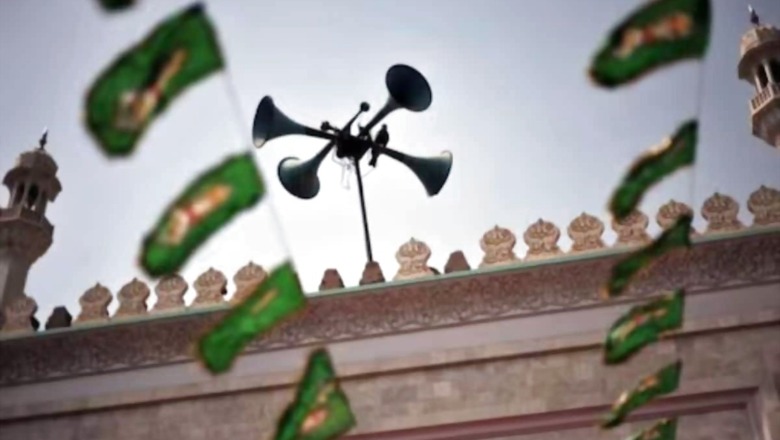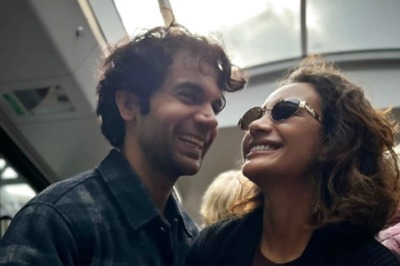The Azaan Row: The Call for Controversy in Karnataka | A Look at Politics, Noise Laws & Muslim Votes

views
Starting a high-decibel controversy on the use of loudspeakers by mosques during azaan (Islam’s prayer call) yet again, Bharatiya Janata Party (BJP) leader K S Eshwarappa on Monday called Allah “deaf". The former Karnataka minister made the remark as the prayer call “disturbed" his speech at a public rally in Mangaluru’s Kavoor.
Speaking as part of the Vijay Sankalp Yatra, when the azaan was heard on a loudspeaker, Eshwarappa, an MLA from Shivamogga which has a large Muslim population, said, “Wherever I go, this (azaan) has become a headache for me. There is a Supreme Court judgment on this…By today or tomorrow, this will end, there is no doubt about it….Can Allah only hear if you shout using a microphone? Even we Hindus do puja, women perform bhajans, but if Allah can hear (their prayers) only if a microphone is used means we have to call him deaf."
An unrepentant Eshwarappa later defended his remark, saying he was expressing the feelings of “common man" and many students and medical patients have complained to him about how it affected them.
He claimed that many have asked whether a law can be introduced to ban the use of loudspeakers in mosques.
SAME GROUSE LAST YEAR
While speaking to the media, Eshwarappa reiterated: “Would the prayers enter Allah’s ears only if two to four microphones are used?"
He had earlier told News18 that the use of loudspeakers to call for prayers should be a soothing one. “It should not become a competition between Muslims as to who can reach out to Allah in a louder tone," he said.
The BJP leader had stoked the same issue last year and it ended at the doorstep of the Karnataka High Court, which restricted the use of loudspeakers in all places of worship.
IMPORTED FROM MAHA
The azaan issue in Karnataka was imported from Maharashtra after it flared up there when Raj Thackeray of the Maharashtra Navnirman Sena (MNS) said they would blare Hanuman Chalisa from loudspeakers near mosques if their demand to remove loudspeakers from mosques was not met. The MNS also found the BJP uprooting this move at the time.
The neighbouring Karnataka was quick to pick it up, amid the controversies surrounding the wearing of hijabs or headscarves by Muslim women in classrooms and seeking a ban on halal food.
In April 2022, right-wing groups in Karnataka demanded a ban on the use of loudspeakers in mosques and Eshwarappa chimed in, seeking a solution by taking the Muslim community into confidence, while keeping the interests of students and patients in mind.
When the question of the use of microphones to play Vedic chants and shlokas from temples early in the morning was raised, he countered: “The chanting won’t hurt anybody, it will only heal."
HANDLED WITH CARE
When the azaan row broke out last year, Karnataka chief minister Basavaraj Bommai decide to take it up legally, step-by-step. He had said that his government would implement the orders of the Supreme Court and HC “in stages". “Everything has to be done by talking, explaining, taking people into confidence and not by force," Bommai said at the time.
“There is a court order that questions why earlier orders on loudspeakers are not being implemented. The decibel limit is prescribed and there is also an order to purchase decibel meters," the Karnataka CM said in April 2022.
Acting on the orders of the courts, the Bengaluru police sent out notices to more than 300 religious places, including temples, churches, and mosques, asking them to follow the rules on acceptable decibel levels as per the Karnataka State Pollution Control Board (KSPCB). The police also started a drive to monitor the use of loudspeakers and their prescribed decibel levels and crack down on places crossing the prescribed limit citing the court orders.
THE LAW OF THE LAND
Over the years, several public interest litigations (PIL) have been filed in high courts across the country, seeking a ban on the use of loudspeakers in mosques.
- In a July 2005 order, the Supreme Court banned the use of loudspeakers and music systems in public places between 10 pm and 6 am (except during times of public emergency) as the high decibels, termed noise pollution, could affect the health of people.
- In October that year, the apex court ruled that loudspeakers could be permitted to be used until midnight on festive occasions for 15 days a year.
- Eleven years later, in 2016, the Bombay High Court passed a ruling that the use of loudspeakers was not a fundamental right. The court observed that all places of religion are bound by noise pollution and no religion or sect can claim it to be their fundamental right to use a loudspeaker or public address system. “We clarify that all places of religion shall scrupulously follow noise pollution rules and no place shall be allowed to use loudspeakers or PA systems without obtaining permission," said the court order.
- The Uttarakhand High court, which heard another PIL on the use of loudspeakers in 2018, directed its state government to set a decibel limit of five for loudspeakers. However, in July 2020, the court modified its 2018 judgment of ‘less than five decibels’ calling it an accidental error. This was after it was highlighted that less than five decibels would mean the level of sound made when a small pin is dropped on the floor.
- The Karnataka High Court banned the use of loudspeakers after 10 pm in an order issued in 2018, which was also based on the guidelines issued by the Supreme Court which specified the permissible levels of sound that can be used. A similar order was passed by the High Court of Punjab and Haryana in July 2019.
- The Allahabad High Court in its order dated May 15, 2020, stated that their opinion is that the azaan may be an essential and integral part of Islam, but the call for prayer could be done using human voice only and not using an amplifying device like a loudspeaker.
- The Karnataka State Waqf Board also issued a circular in 2021, asking mosques and dargahs in the state to refrain from using loudspeakers between 10 pm and 6 am for the azaan. This circular by the Waqf board came after the Karnataka HC directed the state government to crack down on the use of illegal and high-decibel loudspeakers in religious places across the state.
- Based on another PIL filed against loudspeakers, the Karnataka High court pulled up the state government in 2021, seeking an explanation under what provisions of the law were the loudspeakers and public address systems being used in mosques and whether they have acted upon complaints under noise pollution.
MUSLIM VOTES
At a time when Prime Minister Modi and Union Home Minister Amit Shah categorically told the BJP leaders in Karnataka that Muslim votes matter and they should ensure they keep them on their side, Eshwarappa offered a counter.
He said that the BJP will not compromise on ideology and Muslims who truly believe in Bharat Mata and nationalism are with the party and will continue to support the BJP and vote in favour of the party.
“It is the Muslims who support the Popular Front of India (PFI) and Social Democratic Party of India (SDPI) who are not with us and they shouldn’t be," he said.
Read all the Latest Politics News here














Comments
0 comment